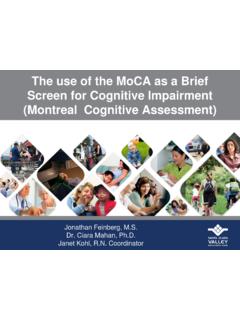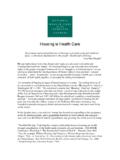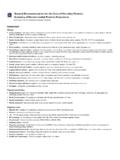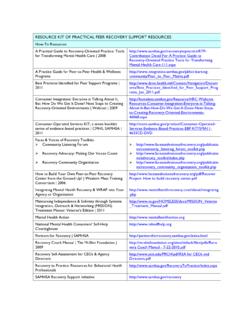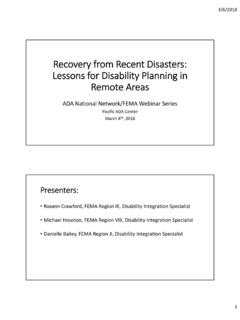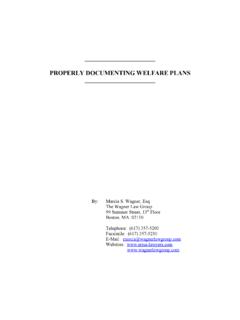Transcription of Documenting Disability - National Health Care for the ...
1 Documenting Disability Simple Strategies for Medical Providers by James J. O Connell, MD Barry D. Zevin, MD Paul D. Quick, MD Sarah F. Anderson, JD Yvonne M. Perret, MA, MSW, LCSW-C Mark Dalton Patricia A. Post, MPA, Editor This project was funded through a Cooperative Agreement with the Health Resources and Services Administration, Department of Health and Human Services. Health Care for the Homeless Clinicians Network September 2007 Documenting Disability : Simple Strategies for Medical Providers HCH Clinicians Network iiDocumenting Disability : Simple Strategies for Medical Providers was developed with support from the Health Resources and Services Administration, Department of Health and Human Services.
2 All material in this document is in the public domain and may be used and reprinted without special permission. Although this manual may not be reproduced for sale, Health care providers are invited to copy and distribute it freely to encourage the fair, accurate and efficient documentation of patients eligibility for Disability benefits. Citation as to source, however, is appreciated. Suggested citation: O Connell JJ, Zevin BD, Quick PD, Anderson S, Perret YM, Dalton M, Post PA (Ed.). Documenting Disability : Simple Strategies for Medical Providers, 82 pages. Nashville: Health Care for the Homeless Clinicians Network, National Health Care for the Homeless Council, Inc.
3 , September 2007. DISCLAIMER The information and opinions expressed in this document are those of the authors, not necessarily the views of the Department of Health and Human Services, the Health Resources and Services Administration, the Social Security Administration, or the National Health Care for the Homeless Council, Inc. HCH Clinicians Network National Health Care for the Homeless Council, Inc. Box 60427 Nashville, TN 37206 0427 voice: 615/226 2292 fax: 615/226 1656 E-mail: Web site: This document may be downloaded free of charge at To order print copies, go to: Documenting Disability : Simple Strategies for Medical Providers HCH Clinicians Network iii PREFACE This manual is a guide to Documenting medical impairments in support of applications for the Social Security Administration s (SSA) Disability benefits programs, Supplemental Security Income (SSI) and Social Security Disability Insurance (SSDI).
4 It is primarily intended for Health care providers in the United States serving individuals with disabilities who are homeless or marginally housed. The original version of this manual, Determining Disability : Simple Strategies for Clinicians by James J. O Connell, MD, was published in 1997 by the Health Care for the Homeless (HCH) Clinicians Network, National Health Care for the Homeless Council and updated in 2004 ( Documenting Disability : Simple Strategies for Medical Providers). This revision further updates the prior publications, based on the June, 2006 edition of Social Security s Medical Listing of Impairments, the latest changes for which are found at In addition, it includes more detailed information about the appropriate documentation of impairments that co-occur with substance use disorders, originally published in June 2007 as a supplement to the 2004 manual: Documenting Disability for Persons with Substance Use Disorders & Co-occurring Impairments.
5 We hope that readers will find the combination of these two manuals in one publication helpful. An extensive bibliography lists resources where more detailed information can be found about federal Disability policy and disabilities frequently seen in homeless populations. The purpose of this manual is to inform clinicians about SSA s Disability criteria and to explain how they can expedite the Disability determination process. The authors contend that Health care providers should play an active role in routinely Documenting their patients medical impairments. By understanding the process of applying for SSA Disability benefits and the requirements for providing evidence in support of a Disability claim, providers can do so more efficiently and effectively.
6 They can also use the process of Disability evaluation and advocacy to engage individuals who are homeless in primary care and mental Health /substance abuse services. Two basic strategies are recommended to support applications for Disability assistance: 1) Refer explicitly to medical criteria for Disability specified in the SSA s Listing of Impairments. 2) For patients whose impairments do not meet or equal the level of severity specified in a medical Listing, document activities the patient can and cannot do. This strategy is most effectively accomplished in collaboration with a multidisciplinary clinical team that includes a social worker and/or vocational counselor.
7 We hope this document will promote stronger therapeutic relationships between Health care providers and homeless people. Most importantly, we hope that its use will enable persons with disabilities to obtain the financial supports they need to achieve stability and improve quality of life. Documenting Disability : Simple Strategies for Medical Providers iv HCH Clinicians Network AUTHORS James J. O Connell, MD, Founder and President of the Boston Health Care for the Homeless program, has worked in Health Care for the Homeless for over 20 years. A clinical instructor in Medicine at Harvard University, he works with multi-disciplinary clinical teams based in homeless clinics at Boston Medical Center and Massachusetts General Hospital, rides an outreach van run by the city s largest homeless shelter, and provides ambulatory care at McInnis House, a short-term recuperative care facility which he helped to create in 1993.
8 Dr. O Connell developed the original version of this guide to Documenting disabilities for homeless SSI/SSDI claimants, Determining Disability : Simple Strategies for Clinicians, which was published by the HCH Clinicians Network in 1997. Barry D. Zevin, MD, is a physician at the San Francisco Department of Public Health s Tom Waddell Health Center/Homeless Programs, where he served as Medical Director for many years. Board-certified in Internal Medicine and certified in Addiction Medicine by the American Society of Addiction Medicine, Dr. Zevin has led the HIV and Substance Abuse clinical teams at Tom Waddell and is also an Assistant Clinical Professor at the University of California, San Francisco School of Medicine.
9 This document reflects his wisdom and long experience in caring for persons with disabilities who are homeless and his commitment to the active involvement of medical providers in Documenting their patients impairments. Paul D. Quick, MD, is a primary care physician at Tom Waddell Health Center in San Francisco. He and other members of the Health Center s Disability Evaluation and Assistance Program worked with the San Francisco Bar Association s Homeless Advocacy Project (HAP) to develop a curriculum for medical providers on the appropriate documentation of functional impairments in support of Disability claims. Drs. O Connell, Zevin, and Quick have served as physician trainers in the National Health Care for the Homeless Council s Documenting Disability Trainings for Medical Providers, held nationwide since 2005.
10 Sarah F. Anderson, JD, is Managing Attorney of the Greater Boston Legal Services Health and Disability Unit and a member of the Homeless Subcommittee of the Massachusetts Disability Determination Services Advisory Committee, which investigates barriers encountered by homeless claimants in applying for SSI/SSDI benefits. She played a central role in the development and revision of both the 2004 Documenting Disability manual and the June 2007 supplement on Substance Use Disorders & Co-occurring Impairments. Yvonne M. Perret, MA, MSW, LCSW-C, Executive Director of the Advocacy and Training Center in Cumberland, Maryland, contributed information especially on substance use disorders and co-occurring impairments.
